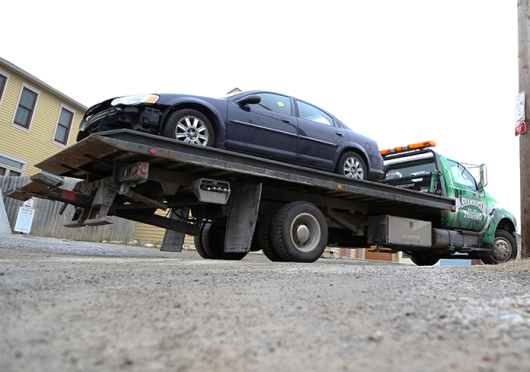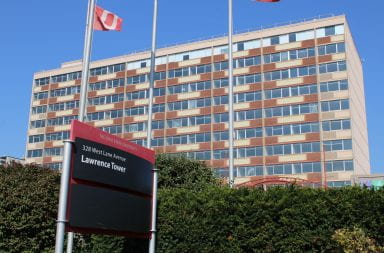
A Shamrock Towing, Inc. tow truck pulls into a vehicle storage location on Feb. 4 at 1145 Hamlet St. in Columbus. Credit: Mark Batke / Photo editor
For some students who have been towed by Shamrock Towing Inc. or Camcar Inc., it’s now payback time — literally.
Shamrock Towing and Camcar, two Central Ohio towing companies, have reached a settlement with some Ohio drivers for charging unlawful “administrative fees.” Drivers towed between Sept. 1, 2008, and July 17 can now potentially receive $23 to $28 back from the $30 to $35 they were unlawfully charged.
According to the class action lawsuit, these companies charged drivers towed in private tow-away zones an extra fee beyond what the state law allows, which is $90 for the tow and $12 per day for storage.
“From the tow truck companies’ perspective, their argument was there are additional costs that go into towing people,” said Molly Philipps, an attorney at Student Legal Services at Ohio State. She said paying for staff and paperwork were a few examples of potential additional costs.
But, “the judge wrote a pretty strong opinion and didn’t agree with them,” said Fred Gittes, an attorney representing the group of drivers in the class action suit with Columbus-based The Gittes Law Group. “Even the signs that these companies put up said what would be charged according to the law.”
Joshua Bills of Pelini, Campbell and Williams, representing Shamrock Towing, and Erica Probst of Kemp, Schaeffer and Williams, LLC., representing Shamrock and Camcar, both declined to comment about the settlement.
The class action settlement required that the companies stop charging the fee, as well as hire third-party administrators to reimburse drivers who were charged the fee, Gittes said.
Class action settlements are brought about when it doesn’t make financial sense for a single person to pursue the matter, because of the typically lower dollar amount involved, Philipps said.
“So you get into this situation where people are just stuck and they’re complacent and they just let it happen, and the reason is that they don’t have access to a legal services organization or some other attorney who is going to pursue their rights,” she said. “However, there are arguably a lot of people who are similarly situated,” and thus a class action lawsuit might take place.
Gittes estimated that as many as 40,000 to 50,000 drivers are affected by this class action.
“This means for many students, staff and faculty, a chance to get money back through a very simple process that’s easy to do,” Gittes said. “It also means they will help hold these companies accountable.”
The Gittes Law Group filed the lawsuit against the towing companies on Aug. 29, 2012, Gittes said.
Gittes said Paul Aker, a 10TV reporter, brought the issue to their attention with special news reports related to towing companies.
“Between seeing his reports, and just getting phone calls, I and the other attorneys involved said, ‘Hey, we need to do something about this,’” Gittes said.
Student Legal Services saw a “decent amount” of these cases and litigated several before the class action settlement took place, Philipps said.
There are three options if someone wishes to file a claim. For some, claim forms have been mailed to them based on Camcar and Shamrock Towing’s records. Recipients can fill out the form and email or mail it in, Gittes said.
Gittes added, though, the companies have incomplete records for long periods of time. Therefore, people who have been towed and have a record, like a credit card charge or invoice, can visit the class action website to fill out and send in the form.
“You can still submit a claim even if you don’t have your receipt,” Philipps said.
Those who have been towed, but have no record, need to fill out, notarize and send in the form, Gittes said.
“You’re going to have to sign an affidavit, which is sworn testimony,” Philipps added.
Those affected by the class action have until May 29 to complete the claim form.
“The claim form will take people five to 10 minutes,” Phillips said. “I think for most students, ($23 to $28) is worth that.”


